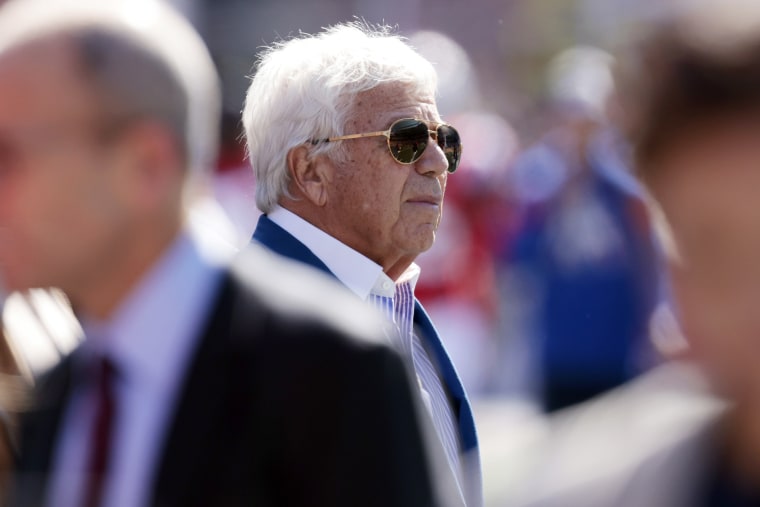New England Patriots owner Robert Kraft said Thursday that the campus protests launched nationwide in response to Israel’s campaign in Gaza are another parallel of the lead-up to the Holocaust.
In an interview Thursday on CNBC’s “Squawk Box,” Kraft, a longtime supporter of Columbia University, said that when he created the Foundation to Combat Antisemitism, in part as a response to the “Unite the Right” protest in Charlottesville, Virginia, in 2017, he saw rising signs of extreme hatred.
In the current college protests, he said, he’s seeing further echoes of the forces that helped give rise to the Nazis.
“It starts like it did in the ’30s in Germany,” Kraft said. “Five years ago, I saw signs of hate developing here. I don’t want the 1940s to replicate here and unfortunately, I’m seeing signs of that and good people have to stand up and be counted. And, you know, that’s where the leadership is.”
“It’s shocking to me that young Jewish students at Columbia, in New York City, are scared,” he added. “They’re going home.”
Chabad at Columbia, the local chapter of the global Hasidic-Orthodox Jewish group, said Sunday that Jewish students have had offensive rhetoric hurled at them, including being told to “go back to Poland” and “stop killing children.”
Even amid reports of harassment of Jewish individuals during the campus protests, other Jewish students are taking part in them. Additionally, Muslim students have also faced threats on campus since the outbreak of the Middle East conflict this fall.
In November, the U.S. Education Department’s Office for Civil Rights opened investigations into alleged antisemitic and Islamophobic incidents at multiple U.S. colleges and universities, as well as a local school district.
Even as Kraft, who graduated from Columbia in 1963, compared today’s protests unfavorably to the antiwar ones he experienced as a student in the 1960s — hailing that era as an “open forum” where “free speech prevailed and people express[ed] their opinion” — he praised the decision to send in the New York Police Department to arrest protesters.
“I think Mayor [Eric] Adams and Governor [Kathy] Hochul and the New York Police Department did a great job when they were called in,” Kraft said. “But this is about enforcing the rules that we have on campus and … holding people accountable.”
Kraft also published an op-ed Thursday on the front page of the New York Post with the headline, “Stand up to Jew hatred: Campus leaders must show courage and stop radical professors from poisoning young minds.”
“The Columbia I loved is no longer a place I know,” Kraft wrote.
He went on to call out faculty members who he said are “more focused on politics than they are on education.” Many faculty members where protests have erupted have expressed solidarity with the protesters when it comes to crackdowns on the demonstrations.
Earlier this week, Kraft announced he would suspend his financial support of Columbia in response to its handling of the protests, though he later clarified in a separate interview that he would still back the Kraft Center for Jewish Student Life on campus, claiming it has been a “haven of safety.”
The nationwide crackdown on campus protests continued Wednesday as 108 people were arrested in protests around Boston’s Emerson College last evening, while police arrested 93 people on the University of Southern California campus in Los Angeles after warning protesters to disperse.
Meanwhile, House Speaker Mike Johnson, R-La., called on Columbia University President Minouche Shafik to resign after meeting with her, while also threatening federal funding for schools.
Columbia’s board of trustees said Wednesday it “strongly supports President Shafik as she steers the university through this extraordinarily challenging time.”

